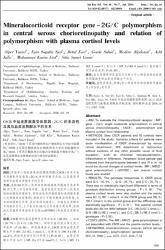Mineralocorticoid receptor gene-2G/C polymorphism in central serous chorioretinopathy and relation of polymorphism with plasma cortisol levels

View/
Access
info:eu-repo/semantics/openAccessDate
2016Author
Yazıcı, AlperSarı, Esín Söǧütlü
Eser, Betül
Şahin, Gözde
Alpdemir, Medine
Kılıç, Adil
Erol, Muhammed Kazım
Ermiş, Sıtkı Samet
Metadata
Show full item recordAbstract
AIM: To evaluate the mineralocorticoid receptor (MR) gene-2G/C single nucleotide polymorphism in central serous chorioretinopathy (CSCR), polymorphism and plasma cortisol level relationship. METHODS: Sixty CSCR patients and 50 controls were included in the study. Inclusion criteria for patients were acute manifestation of CSCR characterized by serous retinal detachment, RPE detachment or dysfunction without evidence of any other possible cause of fluid exudation, such as choroidal neovascularization, inflammation or infiltration. Peripheric blood sample was collected from the participants between 8 and 10 a. m. to avoid the diurnal changes of cortisol levels. MR (NR3C2) gene polymorphism (rs2070951) and plasma cortisol levels sere studied. RESULTS: The genotype frequencies in CSCR group were G/C (46.6%), G/G (26.7%) and C/C (26.7%). There was no statistically significant difference in terms of genotype distribution among groups (P=0.96). The plasma cortisol levels were also studied and the results were 401.2±162.1 nmol/L in the CSCR group and 296.8±130.1 nmol/L in the control group and the difference was statistically significant (P<0.01). The plasma cortisol levels also did not differ between G/C (345.0±137.0 nmol/L), G/G (369.2±165.3 nmol/L) and C/C (395.3±188.8 nmol/L) genotypes (P=0.50). CONCLUSION: The MR (NR3C2) gene polymorphism is not associated with CSCR and the plasma cortisol levels.

















